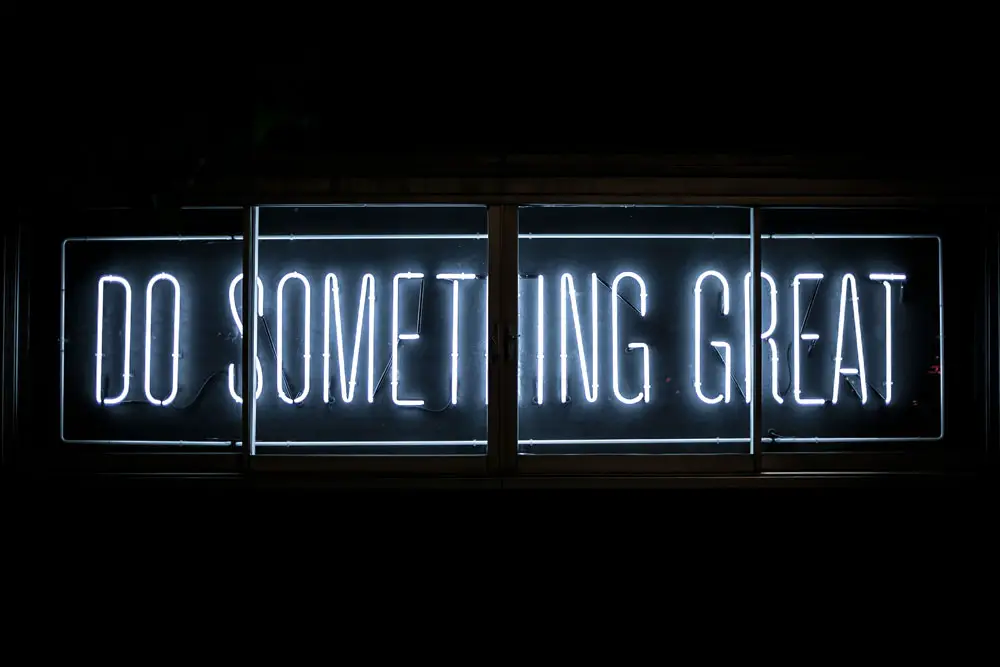How to Make an Impact
Become Aware of The Impact You Have

Most of our lives we move around on autopilot, not knowing from moment to moment the impact we have on others. Did we say thank you to the barista when we went through the drive-through? Most of the time we simply aren’t conscious of the impression we are making.
Becoming self-aware of our contributions to others is an important step in learning to maximize our impact, and to make doing great things possible – no matter where we are. Let’s look at some ways we may already be making an impact that we haven’t considered.
Influencing Others
 People are always observing our behavior and listening to what we say. We are influencing those around us in ways we may not have considered. Your encouragement and positive comments can make an impact on the lives of the people in your sphere of influence.
People are always observing our behavior and listening to what we say. We are influencing those around us in ways we may not have considered. Your encouragement and positive comments can make an impact on the lives of the people in your sphere of influence.
4 Skills You Need to Influence Others
- Political savvy: They grip organizational politics to move teams and important initiatives forward. It is a profound understanding of what other people need, born of empathy, listening and honest communication. You know there are people in your own organization who have inspiration beyond their title or official duties; understanding that influence is political savvy.
- Self-promotion: Leaders cut through the noise with reliable, trustworthy self-promotion that helps others as well as themselves. It making yourself more important.
- Building and maintaining trust: Because leadership often involves guiding people through risk and change, trust is essential. Like Peter Drucker said, “management is doing things right; leadership is doing the right things.”
- Leveraging networks: No leader is an island. They are empowered by their connections with others. ‘It’s not what you know, but who you know’. The leverage of people is key to your success – providing a persuasive reason for you to network effectively: to achieve your goals.
Being of Service
Doing things for others is part of being a member of a family or a community, but we may not realize how much our acts of service make an impact on others’ lives. Helping someone in a time of need, or being a dependable person that others can count on, is not only admirable – it builds trust and boosts self-esteem for those we serve.
Providing Solutions
Are you the “Answer Man” in your family or business? Do you love solving problems, and finding a way through when things seem stuck? As a problem-solver, you can be a great resource to those who feel stuck in a situation.
3 Keys to Provide the Right Solutions:
- Get clear of the current problems of your clients
- Ask your prospects and clients for ideas
- Keep your ear to the ground
Creating A Safe Place
Are you a comforter by nature? Are you able to be the calm in the storm? Creating a safe place for people when they are feeling out of sorts is an important way to help others. Having someone trustworthy to lean on in a time of need makes an unsurpassed impact on a person’s well-being.
These are only a few of the ways that we can make an impact. There are countless others to discover, and there is a great way to find out how you make your best impact doing things that come naturally: journaling.
Journal your activities for two weeks and keep track of the ways you are making an impact on the people in your life.

Pay close attention to your habits. Watch for the evidence of your impact. Did you notice someone smile back at you today? Did you intervene when someone was being rude to the clerk in the store? What activities do you participate in weekly, and how much does your presence contribute to their success?
Your valuable contributions to the world around you are undeniable.
You sometimes may not notice the influence you have, because you are so focused on living your life. Nonetheless, you are making an impact each and every day. With some deliberate intent, you can become aware of your impact and learn to recognize its value.
Focus Your Time and Efforts to Make an Impact
Are you a naturally disorganized person? Do you find yourself running late and feel like you have a dozen half-done projects going at any given time? If you said yes, chances are you might have trouble with focus and effort.
Focus is the ability to give undivided attention to something that matters or is necessary.
An effort is an action that goes into that focus. They rely on one another to create the momentum to see things through to completion. If I asked you to rate yourself from 1-10, where would you put yourself on the “focus and effort” scale?
Sometimes, getting clarity on your experience of focus and effort is all it takes to start making big improvements in your personal, professional, and communal success. Learning to master the art of “getting stuff done” is a crown jewel in the personal development crown.
When you want to make an impact or a difference, your focus is key. The effort follows that focus and they merge together, making an impact easier and more effectively. The best part is: how you do anything is how you do everything. If you can master focus and effort in one area of your life, you can master it in all areas. Good habits are contagious!
Here are three tips for creating focus and improving your efforts to make a difference:
1. Have a plan
Flying by the seat of your pants is great at times, but not smart when trying to maintain focus. Knowing what you want and mapping out how to achieve it is the best way to go. Make a plan and stick to it without deviation, and you will stay focused.
2. Have a team
One person can make an impact, but having a team for support makes it easier to stay focused and make an effort. Having a team to help you with non-related things like babysitting, chores, or other support can help you stay focused and direct your efforts.
3. Make wise choices
Don’t spread yourself too thin. Choose your goals wisely so that your focus and effort make a big impact.
It may seem like you don’t have the time to contribute to making a difference, but that’s just not so. You can create time and make a true impact by being focused and maximizing your effort in powerful ways. Having a plan, getting support, and making wise choices make it possible for even the busiest person to make an impact.
Become Aware of How Your Behavior Impacts Others

There is a theory in behavioral science called the Law of Attribution, or the Attribution Theory. This theory states that most often when we observe others, we attribute their behavior to their character – whereas we attribute our own behavior to our circumstances. This logic applies negative assumptions as to why someone else behaves badly but cuts ourselves slack for our own poor behaviors.
An example would be encountering a sales clerk that appears to be rude and disinterested in helping us. We attribute that behavior to the nature of their character. Most of the time, we decide they are a mean person and shouldn’t be in a helping profession. We then, in turn, are rude to that sales clerk and feel justified, because we have determined they are “innately rude,” whereas we are just mirroring their behavior and would be kinder to them if they weren’t so awful.
We blame them for their behavior and justify our own.
In another scenario, we have just received very bad news and are so distracted, we forget an important meeting and leave someone high and dry who was waiting for us. Without apology, we move on to the rest of our day knowing that the news we received was shocking and terrible, and our actions weren’t purposefully irresponsible; they were just due to our circumstances. Later that week, someone drops the ball and forgets to do something vital for a work project, causing the team to be late for a deadline. Incensed, we shoot off a heated email casting blame, believing our coworker doesn’t have a good work ethic or standards of behavior.
In each case, we attribute our behavior to our circumstances and the other person’s behavior to their character. This simply isn’t fair.
No matter what the reason may be, it is never acceptable to impact someone in an inappropriate way. Our agitation may be justified due to difficult circumstances, but it is no reason to cause pain to others.
When you’re angry or unkind to another person, it impacts them in a negative way. Pay attention and try to change your behavior so that it reflects how you want to impact and treat those around you. If you are in a crisis or in a particularly bad spot, be transparent about your struggle with those around you so they have a chance to offer their support.
If you are in so much pain that you can’t be civil, consider staying in to take a mental health day and doing self-care to help get yourself back on track. Taking care of your emotional health is the number one goal, so you can set a healthy example for those in your sphere of influence.

Leave a Reply